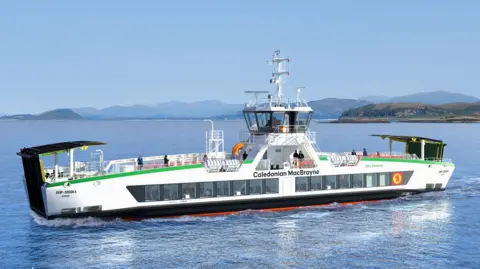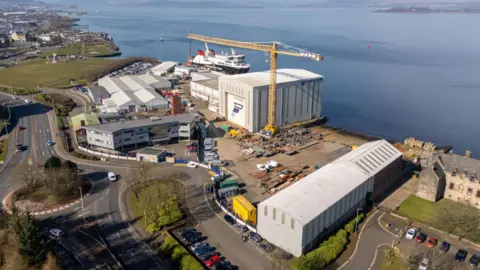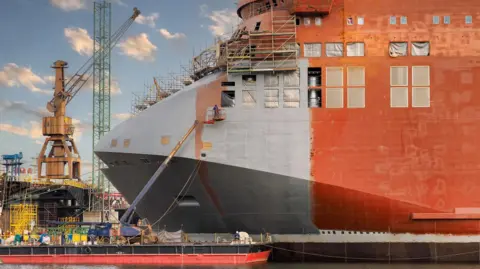No 'social value' scores in CalMac ferries award
 Navalue
NavalueThe contract award for seven new CalMac ferries won last month by a Polish firm was unable to score bids for "social value" without risk of legal challenge, according to Scotland's ferries procurement agency.
The nationalised Ferguson shipyard was among the shortlisted bidders - but lost out to Gdansk-based Remontowa which was able to undercut it on price.
The announcement prompted some politicians to ask whether "social value" - things like employment, training or environmental benefits - had been considered as part of the evaluation.
Ferries body CMAL said assessments were required to be fair to overseas bidders, and there was no legal obligation in Scotland to include social value in the scoring.
However, it said some "community benefits" were secured during contract negotiations which will see 21 apprentices participate in sea trials in Scotland.
BBC Scotland News understands Ferguson Marine fared well in the technical assessment of its bid but lost out on price, which made up 35% of the scoring.
Remontowa offered to build the ferries for just over £21m each.
Port Glasgow-based Ferguson's had vowed to bid "aggressively" for the small vessels contract which was a key part of its five-year business strategy.
The electric ships are similar to ones it has built successfully in the past, and it hoped a pipeline of repeatable work would improve productivity, allowing it to move on from difficulties faced with two much larger gas-powered CalMac ferries.
While the yard has no confirmed orders beyond the second ship, MV Glen Rosa, it is pursuing private sector business and subcontracting work from BAE Systems.

Three years ago, a refreshed National Shipbuilding Strategy said it would seek to maximise opportunities for UK suppliers with a 10% social value component in government contracts.
The UK government's Procurement Act (2023) also introduced a requirement to "maximise public benefit" when awarding contracts.
But Scottish government-owned CMAL said it was not covered by the act, and it was not permitted to discriminate against overseas bidders.
A spokesperson said: "While Scottish public authorities can include social value considerations in procurements, they are not permitted to set requirements which would unlawfully discriminate against foreign shipyards and must at all times treat all bidders equally."
New official figures show Scottish public bodies awarded £16.6bn of contracts in 2022/23 with £8.9bn going to Scottish firms and £7.7bn spent elsewhere.
Would social value scoring make a difference?
Critics of current public procurement rules claim they are too narrowly focused on headline project costs, and ignore the wider economic and social benefits.
Industry body Maritime UK has called for measures such as minimum levels of UK-based content in contracts, which is increasingly a feature of wind energy licences.
A 10% social value evaluation element is required where appropriate for high value public contracts in other parts of the UK but is not mandatory in Scotland.
But any social value scoring has to be used in a non-discriminatory way, so a tender involving overseas bidders must also give them a fair chance of picking up points.
Procurement law expert Duncan Osler from legal firm Morton Fraser MacRoberts, says that despite Brexit, international agreements designed to remove obstacles to trade still govern public procurement.
He said: "Simply to target a procurement so a local contractor can effectively have an advantage and win even if they are more expensive or lower quality would open the authority to a risk of legal challenge."
In other words, social value scoring could have a small impact in that it dilutes the influence of cost in the procurement exercise, but the overall effect is likely to be marginal.
 Getty Images
Getty ImagesThe 2022 refreshed National Shipbuilding Strategy identified a pipeline of 150 UK and devolved government ship orders over the next 30 years - both military and civilian - which could be used to boost domestic shipbuilding.
But Glasgow MSP Paul Sweeney, convener of Holyrood's cross-party maritime and shipbuilding group, said commercial shipbuilders were still struggling to win orders.
"So far we have seen almost all of the non-naval shipbuilding contracts in the pipeline go to overseas shipyards due to their competitive financing arrangements," he said.
"The UK and Scotland simply isn't competing aggressively enough on the shipbuilding finance necessary to win orders."
The contract for the seven small CalMac ferries is the biggest multi-vessel deal in Remontowa's 79-year history.
The shipyard has previously built three CalMac ships between 2005 and 2011 - MV Bute, MV Argyle and MV Finlaggan.
In 2015 it was runner-up to Ferguson's when the Port Glasgow firm was awarded the contract for the two dual-fuel ferries MV Glen Sannox and MV Glen Rosa.
A BBC documentary later presented evidence that the procurement for the complex ships may have been "rigged" in favour of Ferguson's, although a KC-led investigation commissioned by CMAL found no evidence of "criminal" corruption.
Community benefits
While the evaluation of the bids for the small vessels contract did not include any social value element, CMAL said it did subsequently agree some community benefits with Remontowa.
For each of the ferries, three apprentices will be involved in sea trials once they arrive in Scotland, beginning in 2027.
Remontowa will also contribute several thousand pounds to a community fund run by CMAL which has, in the past, helped pay for IT equipment in Scotland.
The value of the contract to the Polish firm is £147.5m, but a further £12.5m is being spent transporting the finished vessels, on CMAL's costs overseeing the build and a 3% budget contingency.
